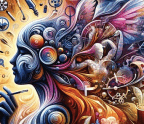ALONE TOGETHER IN THE PANDEMIC

THE PAST IS a different country, one I used to live in.
In that country, as I remember it, people moved about and met with others freely, passing close to strangers on the sidewalk, wearing gloves and scarves only when the weather required it. They rode crowded buses and packed subway trains, commuting to their offices so they could sit through meetings in close proximity to their yawning colleagues. They stood in lines and watched kids climb on playground equipment. They went to restaurants with dates and had intimate conversations over dinners prepared by someone else, delivered by platoons of waiters whose hands touched each and every plate. They shared sips of expensive cocktails with fussed-over garnishes containing liquors imported from all over the world. They propped themselves up on comfortingly scuzzy stools at crowded dives, drinking cheap beer as other patrons unthinkingly brushed against them. They watched sports, and they played them.
In that country, people sweated out their frustrations in gyms, sharing weights and treadmill grips. They watched suspenseful movies in darkened theaters, never knowing who might be sitting nearby, breathing in unison as killers stalked through crowded streets onscreen. They hugged each other. They shook hands.
They gathered together, to celebrate, to mourn, to plan for a future that seemed, if not precisely knowable, likely to fall within expected parameters. And, though it seems foreign now, they treated each and every one of these moments as ordinary and unremarkable, because they were.
No longer. Over the course of a few weeks in March, America, along with much of the Western world, became a different country. A novel coronavirus was spreading via physical proximity. So in order to slow its transmission, the places where people gathered together—bars, restaurants, gyms, stadiums, movie theaters, churches—were closed. Workers were sent home from offices. Much of the populace was put into lockdown, under orders to shelter in place. People were effectively sent into hiding. What they were hiding from was each other.
The toll taken by the virus and COVID-19, the deadly disease it causes, can be measured in lives, in jobs, in economic value, in businesses closed and plans forgone. That toll is, by any accounting, tremendous—more than 74,000 dead in the U.S. by the first week of May, more than 33 million unemployed, an economy that may shrink by 20
You’re reading a preview, subscribe to read more.
Start your free 30 days





